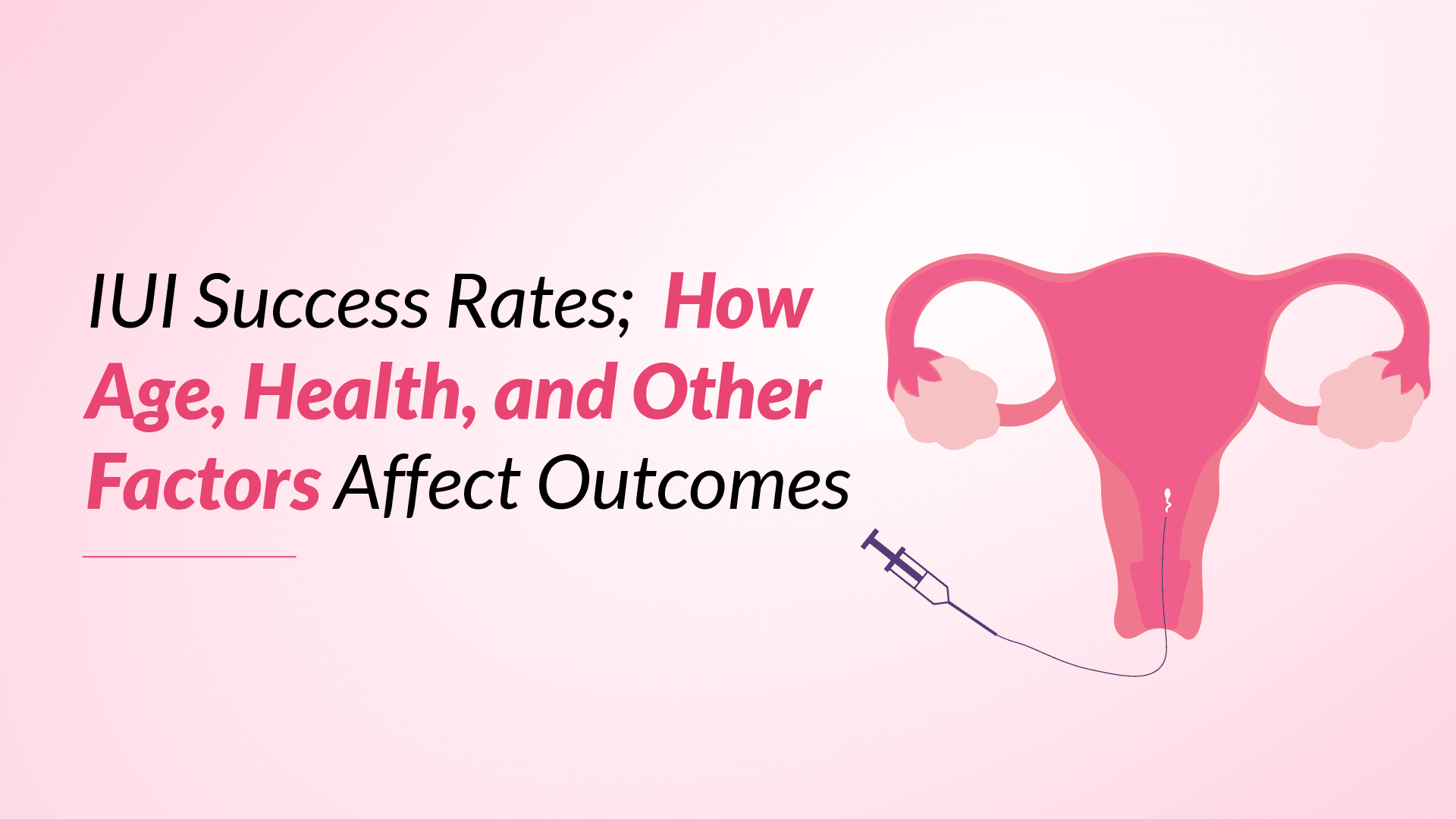Intrauterine insemination (IUI) is a popular fertility treatment that provides hope to couples who are trying to conceive. IUI success rates might vary greatly depending on age, health, and underlying fertility issues.
Understanding IUI Success Rates
Understanding IUI (Intrauterine Insemination) success rates is critical for couples considering fertility treatment since they can vary greatly depending on age and health, the duration of infertility, endometrial thickness, sperm concentration, and motility. Considering these factors helps couples make informed decisions about fertility treatment options and understand their chances of IUI success.
Keys to a Successful IUI
Intrauterine Insemination (IUI) success rates depend on several key factors that significantly impact outcomes, making it essential for couples to understand these variables to improve their chances of pregnancy.
Timing of Ovulation
The effectiveness of intrauterine insemination (IUI) depends on the timing of ovulation because, in order to increase the odds of fertilization, insemination must take place during a certain window of time when the egg is viable. In natural cycles, ovulation normally takes place 36–48 hours after the dose of hCG, whereas it usually happens 25–56 hours after the start of a spontaneous LH surge. The success rate of IUI with one mature follicle is generally lower than with multiple follicles, but it can still lead to pregnancy, with success rates depending on factors like sperm quality, ovulation timing, and overall fertility health.
Sperm Quality and Preparation
The success rate of intrauterine insemination (IUI) depends on the quality and preparation of the sperm since larger concentrations of motile sperm greatly increase the chance of fertilization; for best results, a minimum of 8-10 million motile sperm are indicated.
Monitoring Hormones
Since IUI improves ovulation timing accuracy and dramatically raises clinical pregnancy rates when compared to spontaneous ovulation techniques, monitoring hormone levels—especially those related to the administration of human chorionic gonadotropin (hCG)—is crucial for maximizing IUI success rates.
IUI Success Rate by Age
Age and the success rate of IUI are strongly related since aging affects a woman’s overall fertility and egg quality. IUI success rates vary by age.
Success Rates in Women Under 35
Due to improved egg quality and general fertility health, women under 35 had a greater success rate with intrauterine insemination (IUI), usually between 10% and 13% every cycle. Compared to older women, whose success rates drastically drop with age, this age group gains significant benefits from IUI.
IUI Success in Women Over 35
The success rate of intrauterine insemination (IUI) for women over 35 usually falls between 10% and 9% every cycle. For women over 40, the percentage may drop as low as 3% to 9% because of deteriorated egg quality and reproductive health. This highlights how age affects the results of reproductive treatments; thus, it is important for older women to weigh their alternatives carefully.
Health Factors Impacting IUI Success
Intrauterine insemination (IUI) success rate is greatly impacted by health variables, which affect the chance of IUI conception through a variety of physiological and lifestyle-related factors affecting IUI success.
- Hormonal Imbalances: Ovulation, the endometrial lining, and overall fertility are all impacted by hormonal imbalances, which can have a major effect on the outcome of IUI treatment.
- Polycystic Ovary Syndrome (PCOS): Due to hormonal imbalances and unpredictable ovulation, PCOS can make it more difficult to conceive and decrease the effectiveness of IUI treatment.
- Endometriosis: By producing inflammation and scarring, endometriosis can impair sperm function, implantation, and egg quality, hence decreasing the effectiveness of IUI treatment.
- Impact of Uterine Health on IUI Success: IUI success depends on uterine health since conditions like fibroids, polyps, or an aberrant uterine lining might interfere with embryo implantation and lower the likelihood of pregnancy.
- Male Factor Infertility: IUI success can be greatly impacted by male fertility issues, such as low sperm count or poor motility, which decrease the chance that sperm will reach and fertilize the egg.
- The Role of Cervical Mucus: The effectiveness of IUI is greatly influenced by cervical mucus, which helps sperm get to the egg for fertilization and survive.
- The Impact of Smoking on IUI Success: By lowering the quality of eggs and sperm, decreasing uterine receptivity, and raising the risk of infertility, smoking has a detrimental effect on the effectiveness of IUI.
- Alcohol and IUI Success: By altering hormonal balance, egg quality, and implantation rates, alcohol use might decrease IUI success and, consequently, reproductive results.
- Impact of Stress on IUI Success: Stress may reduce the odds of conception by interfering with hormone levels necessary for ovulation, implantation, and general reproductive function.
IUI Success Rates in India: An Overview
In India, IUI success rates vary from 10% to 20% every cycle, with women under 35 having a greater success rate. Age, underlying reproductive issues, and the number of cycles attempted all have a significant impact on results, with cumulative success improving with further efforts. The Ministry of Health and Family Welfare’s recommendations on Assisted Reproductive Technology (ART) continue to impact treatment protocols.
IUI Success on First Try: What to Expect?
IUI success rates on the first try generally range from 10% to 20%, depending on age and reproductive concerns. Many couples require multiple cycles for increased odds of success.
How Many IUI Attempts are Typically Needed?
For women under 35, three to six rounds of intrauterine insemination (IUI) are recommended before considering IVF, while those over 40 should try three cycles. This strategy increases the odds of conception because success rates tend to improve with subsequent tries.
IUI Procedure Success Rates: How It Works?
Success rates of IUI procedures depend on factors like age, the woman’s ovarian reserve, sperm quality, and any underlying fertility issues.
The Role of Hormone Stimulation in IUI
In order to increase the likelihood of successful fertilization, hormone stimulation is utilized in IUI to encourage the development of multiple eggs. Usually, gonadotropins or oral ovulogens are used in this therapy to regulate ovulation and increase the chance of pregnancy.
Sperm Washing and Its Impact on Success
An essential part of the IUI procedure is sperm washing, which extracts healthy sperm from the semen, eliminates contaminants and boosts sperm motility. This guarantees that only the best sperm reach the egg, increasing the likelihood of successful fertilization. Sperm washing has been shown to increase IUI conception success rates by improving sperm quality and lowering the likelihood of immunological responses, especially in cases of male infertility.
Tips for Increasing IUI Success Rates
Optimizing timing, hormone therapy, sperm quality, and general health are all important aspects of increasing IUI success rates, along with close observation by fertility experts to enhance results.
- In IUI conception, timing and ovulation tracking are essential because they guarantee that sperm is administered at the ideal time for fertilization, greatly increasing the likelihood of success.
- A balanced diet and adequate nutrition support hormonal balance, egg and sperm quality, and overall reproductive health, improving IUI success rates.
- Maintaining a healthy weight and engaging in regular exercise are essential for improving IUI success because they maximize the quality of eggs and sperm, boost fertility, improve hormonal balance, and reduce risks like insulin resistance or polycystic ovarian syndrome (PCOS).
- Though it’s crucial to speak with a healthcare professional for specific recommendations, taking supplements like folic acid, vitamin D, and CoQ can help increase fertility by promoting sperm motility, egg quality, and general reproductive health.
- Acupuncture and alternative therapies may enhance fertility by regulating hormone levels, lowering stress, and increasing blood flow to the reproductive organs, complementing traditional medical treatments.
- Alcohol and caffeine can have detrimental effects on hormone levels, egg quality, and sperm motility; thus, cutting back on these substances supports reproductive health and boosts IUI success.
- Sperm washing increases the odds of conception by eliminating contaminants and toxins that may interfere with fertilization, enhancing motility, and separating high-quality sperm.
- Since hormones are essential for controlling ovulation, sperm motility, and the uterine environment for implantation, achieving optimal hormonal balance prior to IUI is essential for increasing success rates. During the IUI procedure, maintaining ideal hormonal health increases the chance of successful fertilization and implantation.
Find Hope and Solutions for Female Infertility and Male Infertility — Explore Our Comprehensive Services
IVF Treatment
ICSI Treatment
PICSI Treatment
Fertility Preservation Service
Blastocyst Culture & Transfer Treatment
Genetic Screening & Testing
Conclusion
IUI is a hopeful and less intrusive fertility treatment option that can help many couples become pregnant, especially when paired with hormonal support and a healthy lifestyle at the right time. A number of variables, including age, general health, ovarian reserve, and sperm quality, affect IUI success rates. Multiple IUI cycles increase the odds of conception, but treating underlying medical issues and achieving hormonal balance boosts the success of the treatment.
Visit Our Clinic:
Fertility Clinic in Hyderabad
Fertility Clinic in Visakhapatnam
Fertility Clinic in Vijayawada
Fertility Clinic in Karimnagar
Fertility Clinic in Warangal
Fertility Clinic in Rajahmundry
Fertility Clinic in Tirupati
Fertility Clinic in Kurnool





























